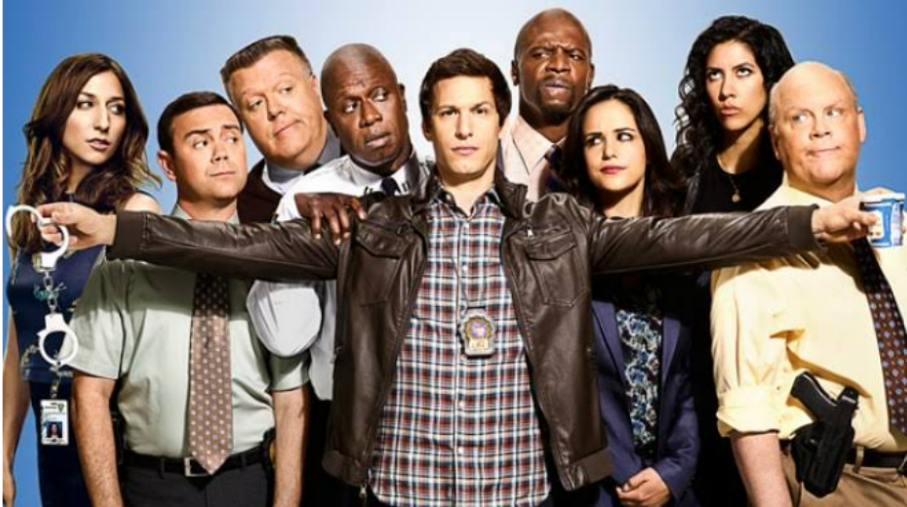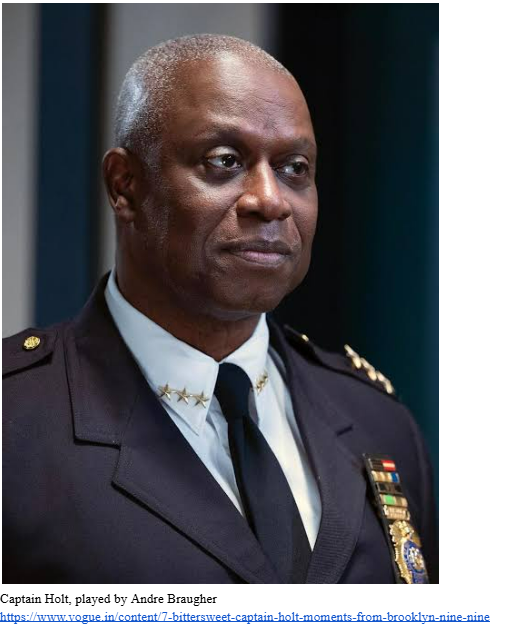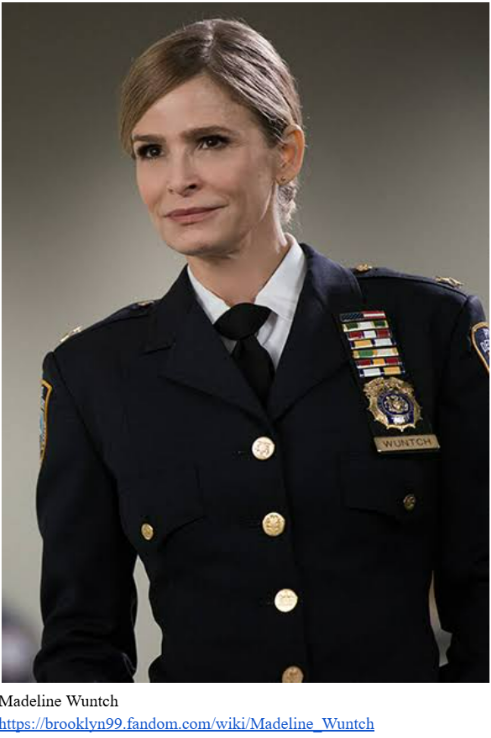“You know what the toughest part about being a gay, black police officer is? … The discrimination” – Captain Raymond Holt, S1 E17 (Full Boyle)
Introduction
Brooklyn Nine-Nine has been hailed as one of the most impactful comedy shows of all time. It has contributed heavily to popular and meme culture and has sparked several conversations about racism, homophobia (and overall anti LGBTQIA+ sentiment), police culture in the media (or copaganda) and several other topics, which will be discussed in the article. It has, however, faced criticism for being ‘too political’, especially in the later seasons. Despite its political discourse, it never lost its signature “light and breezy” humour, which set it apart from other shows.
This article aims to unfold the interaction between media and politics, and explores if the media can push a certain political narrative.

Captain Raymond Holt: The NYPD’s first Openly Gay, Black Police Captain
Captain Raymond Holt (Andre Braugher) had mentioned several times over the course of the show that it was more difficult for him to reach his position because of his race and sexuality, and was often discriminated against as a detective. He was called names like ‘Emily Dickinson’, was left out of photographs (as seen in some of the pictures at his house) and activities with his squad (when some of his colleagues, who were all white, were discussing going golfing, Holt joined in, hinting that he would like to join. Their only response was contemptuously asking him if he wanted to caddy for them.) He was actually a very good cop. He did decades of good police work, arresting over six hundred criminals and solving several high profile cases.
Despite the discrimination and racial profiling he faced, Captain Raymond Holt did his job with his head held high, even marrying Kevin Cozner (played by Marc Evan Jackson), a professor of Classics at Columbia University. Kevin and Raymond got married soon after gay marriage was legalized in America. They were unsure when or if it would be struck down, so they rushed to get married. They wedded in the street and did not even let the officiant finish before they said their ‘I dos.’
Kevin was initially distrustful of the squad at the Ninety-ninth Precinct, fearing that his husband would face the same discrimination he had for all these years. He was reluctant to invite the squad to Holt’s birthday party. Nevertheless, the squad accepted Captain Holt with open arms, even making him their father figure. Hitchcock and Scully, the oldest detectives on the squad, did not mind Holt being gay, even though they were from an older, less accepting generation. This showed the progress made in accepting homosexuality, even among the previous generations.
Captain Raymond Holt’s dream had finally come true. After years of facing homophobia and racism, struggling to climb the ranks of the New York Police Department, and spending eight long, unhappy years ‘rotting away behind a desk in the public relations department’, longing for the chance to become eligible for a command of his own. Now, he had one who loved him and rallied around him. Jake even caught a criminal and pulled some strings to bring their Captain back again. He too, loved them like a father, secretly helping Jake with his case, saving Jake and Amy’s relationship from being sabotaged by the ‘Vulture’ (a narcissist Captain who held a grudge against the Nine-Nine) and comforting Rosa when she came out as bisexual, with the famous quote, “Every time someone steps up and says who they are, the world becomes a better, more interesting place.” The story of the NYPD’s first openly gay, Black Captain is a bittersweet one indeed!

Amy and Rosa: Female, Hispanic cops
Amy Santiago (Mellissa Fumero) and Rosa Diaz (Stephanie Beatriz) were the two Hispanic characters in the show. They were both tough in their own ways and fought hard to prove themselves. When Rosa came out as bisexual and revealed that she was dating a woman, her family took it very badly, saying that it was just a phase. This attitude shows the overall anti LGBTQIA+ sentiment still prevalent in today’s society.
The Vulture was openly sexist towards them. He told them that because they were women, they would automatically be into planning and should thus plan an epic birthday party for him. They took their revenge, hiring him and his band to play at his own party. They also broke the stereotype that Hispanic people were untrustworthy criminals. As Hispanic women, who were police detectives solving important cases, they stepped out of the tight cages of societal cliches. Amy’s story also tells us about the sexual harassment so common for women in the workplace. Before making detective and joining the nine-nine, she was sexually harassed by her own boss. This incident was a nod to the #MeToo movement, which had taken the world by storm, when millions of women shared their stories.

Copaganda, Police Brutality and Brooklyn Nine-Nine
Police culture in the media often shows only the good cops, who are simply fighting for justice. It doesn’t show the corrupt bad cops, who brutalise people, and often even kill them (George Floyd and the BLM movement). While Brooklyn Nine-Nine shows mostly the good cops, it also doesn’t shy away from talking about the bad cops. The ‘Vulture’ is corrupt, sexist and lets his personal grudges affect his work. Madeline Wuntch, who harbours a strong dislike for Captain Holt, had the Captain reassigned to the PR department and would not even let him turn it around, like he did the Nine-Nine. He was a talented cop whose talents were being wasted. Racial profiling of African-American officers has also been shown. A notable example is when Sergeant Jeffords was arrested for simply going to the pavement in front of his own house at night to pick up his daughter’s blanket. The (White) officer nearly arrested him because he looked “out of place” in that upscale neighbourhood. Only when it was proved that he worked for the NYPD was he let go. On the other hand, when Jake, a White male was breaking into his friend’s house, the police just let him be, after seeing he was White. The show talks about racial profiling, a common problem in the US, when Holt was looking at the issues of the NYPD.

Police brutality is not an uncommon subject in America. In 2020, the murder of George Floyd by a White officer shocked the world and sparked off the Black Lives Matter movement worldwide. The subject of police brutality comes up when Rosa quits the NYPD after the George Floyd killing and becomes a Private Investigator. It is also briefly mentioned when Captain Holt is working on solving issues in the NYPD. However, in some instances, like in ‘Jake & Amy’, the squad does seem to condone police brutality. Jake asks Terry and Rosa to ‘use force’ to get the dry cleaners to clean Amy’s veil first. When Terry asks if he should be abusing their power, Jake makes it into a joke, but the second his back is turned, he tells Rosa that he was not exaggerating, at which she smiles. Jake and Charles have beaten up people fighting in the street. Rosa is also quite violent and enjoys destroying precinct property. The squad has often slammed criminals into cars to arrest them. Such incidents are not uncommon to hear in the news, be it in the US or abroad.
The Politics of Brooklyn Nine-Nine
Like most shows produced in America, Brooklyn Nine-Nine is shown through a democratic lens, with a progressive mindset. Its diverse cast and showcasing of the numerous problems that plague the NYPD are a testament to its liberal ideas. The political leanings of individual characters are not explicitly mentioned, but judging by their interactions and thoughts, it can be assumed that they have liberal ideologies.
Many agree that the show got too political towards the later seasons, which was written during a time of political conflict in America, with the BLM movement and several other issues. At this time, we see Rosa leave the NYPD because she was shocked and disillusioned by the attack on an African American man by a White officer and how he had to face almost no consequences for it.
Apart from regular politics, the show also navigates the murky waters of office politics. A major plotline on the show is Captain Holt’s enmity with Madeline Wuntch, his superior. She had always tried to subdue him, by sending him to the PR department after he solved an important case, by refusing to sign off on items needed by the Nine-Nine and by constantly belittling him. Holt, in response, insulted her back, but also tried to be tactful to get things he needed for his precinct. Holt celebrated Wuntch’s death by tossing bagels to everyone in the precinct. Holt had to face this behaviour from Wuntch, and had had to tolerate her trying to sabotage the precinct every chance she got, all because of a petty argument. She could not tolerate him being successful and thus used every opportunity to sink him. We can draw parallels to real life, with many employers mismanaging their employees, just like Wuntch mismanaged Holt and the precinct.
Is Brooklyn Nine-Nine Woke?
Critics claimed the show was trying to be too ‘woke’, because the characters did not necessarily conform to stereotypes. Captain Holt, a gay Captain , was unusual enough, but he also did not conform to the ‘gay’ stereotype. Gay men have often been stereotyped as being effeminate, frivolous and ‘party animals’. Holt and Cozner were very highly educated, masculine and thought that Classical music was the height of popular culture, exactly the opposite of a stereotypical gay man. Terry, a muscular, fit, ‘macho’ man, was in fact a family man who had to take a year off active duty after his twins were born, fearing his injury or death would ruin his family, Terrence Jeffords may have solved cold cases and worked out the whole day, but he was always there to sing his girls a lullaby. Jake left the NYPD, a job he loved, soon after his son’s birth, to become a stay-at-home father, just so Amy could continue to work her place up the rung of the force. Critics have called this action unlike Jake, who was immature and lived for his job, but fans feel that Jake grew up a lot after having his son, and in a world where stay-at-home fathers are emasculated and working mothers ridiculed, Jake making this sacrifice was a heartwarming scene to watch. People felt the show went “Full Woke” in its final season, which was made after the George Floyd murder. The writers had to make a police comedy show, while the public sentiment about cops was very negative. To keep the show from losing relevance and stirring controversy, they evidently tried to bring awareness to the very real issues that people faced and tried to fulfill their public responsibility.
The Effect of Media On Politics
Media and politics has been an oft-discussed topic and the subject of many scholarly publications. Media definitely has a huge impact on politics. According to a research paper by Gadi Wolfsfeld, ‘Making Sense of Media and Politics: Five Principles in Political Communication’, political power can be translated to power over all forms of media. This is very clearly seen in history- political leaders and dictators manipulating the media to push a certain narrative and make themselves look good. The media is thus able to push a certain narrative and influence people’s opinions, be it by showing only a certain viewpoint, or wording the pieces. It is therefore up to the public to be wise readers and seek the full truth before picking a side.


